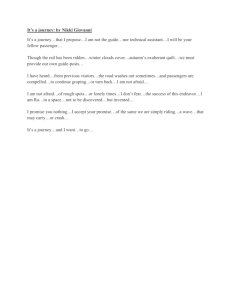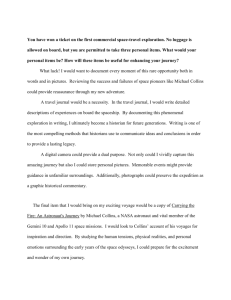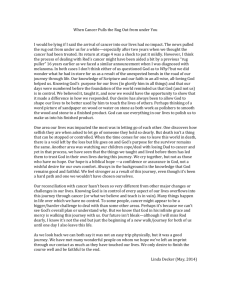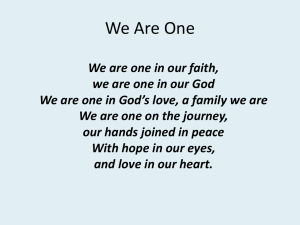EPIPHANY-C-January-6-2013-Richard-Holloway-and-the
advertisement
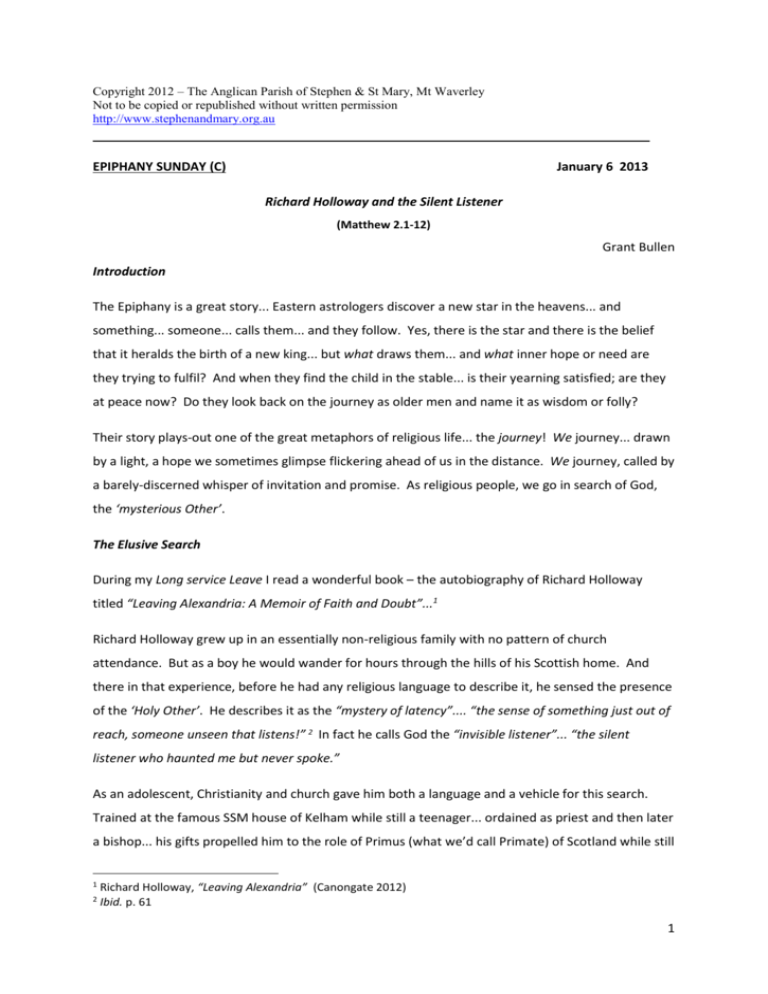
Copyright 2012 – The Anglican Parish of Stephen & St Mary, Mt Waverley Not to be copied or republished without written permission http://www.stephenandmary.org.au EPIPHANY SUNDAY (C) January 6 2013 Richard Holloway and the Silent Listener (Matthew 2.1-12) Grant Bullen Introduction The Epiphany is a great story... Eastern astrologers discover a new star in the heavens... and something... someone... calls them... and they follow. Yes, there is the star and there is the belief that it heralds the birth of a new king... but what draws them... and what inner hope or need are they trying to fulfil? And when they find the child in the stable... is their yearning satisfied; are they at peace now? Do they look back on the journey as older men and name it as wisdom or folly? Their story plays-out one of the great metaphors of religious life... the journey! We journey... drawn by a light, a hope we sometimes glimpse flickering ahead of us in the distance. We journey, called by a barely-discerned whisper of invitation and promise. As religious people, we go in search of God, the ‘mysterious Other’. The Elusive Search During my Long service Leave I read a wonderful book – the autobiography of Richard Holloway titled “Leaving Alexandria: A Memoir of Faith and Doubt”...1 Richard Holloway grew up in an essentially non-religious family with no pattern of church attendance. But as a boy he would wander for hours through the hills of his Scottish home. And there in that experience, before he had any religious language to describe it, he sensed the presence of the ‘Holy Other’. He describes it as the “mystery of latency”.... “the sense of something just out of reach, someone unseen that listens!” 2 In fact he calls God the “invisible listener”... “the silent listener who haunted me but never spoke.” As an adolescent, Christianity and church gave him both a language and a vehicle for this search. Trained at the famous SSM house of Kelham while still a teenager... ordained as priest and then later a bishop... his gifts propelled him to the role of Primus (what we’d call Primate) of Scotland while still 1 2 Richard Holloway, “Leaving Alexandria” (Canongate 2012) Ibid. p. 61 1 in his 40’s. Through all this ‘glittering career’, he was propelled onward by the personal yearning to know that elusive God he’d sensed in the hills of his childhood. And he wanted certainty... that is, to know that he’d actually arrived at the stable where the star stopped (if we use the Epiphany metaphor)... He wanted what he assumed would be the peace of having arrived at that final destination... the fulfilment that awaits the successful conclusion of the quest. But certainty and completion never came... and he felt the God he searched for never answered, no matter how much he called. In his autobiography he describes the experience through a poem called The Listeners by Walter de la Mare... “A traveller arrives at a house in the forest and gets no answer to his repeated knocking. ‘Is anybody there?’ said the Traveller, Knocking on the moonlit door; And his horse in the silence champed the grasses Of the forest’s ferny floor; And a bird flew up out of the turret, Above the Traveller’s head: And he smote upon the door again a second time; ‘Is anybody there?’ he said. He knocks for a third time, with no result. ‘Tell them I came, and no one answered, That I kept my word’, he said. He gets back on his horse and rides away...” 3 This poem unsettles my world... that anyone should endure such agony... ‘I have searched... I have knocked and called... and no one answered!’ But it is Richard Holloway’s experience... and I’ve heard others say similar. Is it mine??? Holloway’s honesty disturbs me... I’m challenged by it... threatened even. In truth, I haven’t found certainty either... I haven’t found perfect peace or happiness... nor the answer or the formula. I don’t feel as if I’ve arrived either! (What about you? What’s your experience of searching for God?) Richard Holloway became increasingly disgusted with what he saw as the church’s pretence of certainty... especially when it used this to condemn and persecute minorities. The final straw was the Lambeth Conference of 1998 when a bitterly-contested rejection of homosexuality (which we 3 Ibid. p. 60 2 still live with) became established as our official Anglican position. A year or so later he resigned4, saying he no longer had sufficient certainty to promote the Christian faith in any official capacity, let alone as a bishop. And Yet At first it appeared as if he had indeed lost all semblance of faith, and there were indeed ‘days of anger’ in his public statements. As a priest who deeply respected him, I listened with sadness as he described himself as ‘one no longer on the Christian journey’... and yet even at his angriest and most critical, I heard a spark there... a spark I recognise from my own search for God. Then last year (2012) he released this autobiography – still powerfully critical of the church in its hypocrisy and corruption, but so generous... compassionate; so human... real, authentic and honest... and for me as a priest-still-in-harness, a profound inspiration and an encouragement to keep going... to stay on the journey. And to watch his face on the YouTube interviews released to accompany the book5, in his favourite church of Old St Paul’s in Edinburgh, where he often goes to sit... and to join in the worship (still without certainty)... and occasionally to speak... is quite beautiful. No, he doesn’t have sufficient belief to represent the Christian faith, and yet he wants the church to live... to be there for people... because he understands the deep human ache we have for ‘God’ (however defined), and how empty godlessness is. As he does repeatedly through his book, he describes this with a poem called “Missing Him” by Dennis O’Driscoll... “Miss Him when a choked voice at the crematorium recites the poem about fearing no more the heat of the sun. Miss Him when we stumble on the breast lump for the first time and an involuntary prayer escapes our lips; when a shadow crosses our bodies on the X-ray screen... Miss Him when the linen-covered dining-table holds warm bread rolls, 4 5 2000 Easy to find… Look for the interviews under his name by Canongate Books. 3 shiny glasses of red wine.”6 He is no enemy of the church... but what he asks of us is that we be honest, and that instead of promoting a rigid certainty and using it to criticise others, we be honest about our journey... a journey that explores infinite mystery... a journey that follows a star whose destination is beyond even our best imagining.7 Is Richard Holloway still on the religious journey? I don’t want to do him the disrespect of enlisting him to a cause he no longer espouses, but I find his words inspiring and encouraging, and I would be honoured to be considered a fellow-traveller with him. 8 Conclusion I love the story of Epiphany, and the religious metaphor of the journey – it is a metaphor that has been dominant in my life of faith. It often feels like a search for God, a noble quest to find the ‘invisible Listener’, an heroic journey of exploration into the mystery of the divine... But these days I am also cautious. Because the search is also an illusion – that is, God is immediately and eternally with us... or to use another metaphor, ‘God is the sea in which we swim... the air that we breathe.’ Thus the feeling of distance and separation – which we all feel 9– is perception not reality... it is the fruit of our fear and our holding-back. God is our one and only home. God always calls... whispers... beckons... It is not so much a matter of us bridging a terrible divide, as us waking-up... clearing the mist that blankets our eyes and seeing truly where we are. Ah... but now we’re starting another sermon... So to conclude with one of Richard Holloway’s favourite poems, by the 13th century Sufi poet, Rumi... “Come, come, whoever you are, Wanderer, worshipper, lover of leaving, It doesn’t matter. Ours is not a caravan of despair. Come, come even if you have broken your vows a thousand times. 6 Ibid. p. 52 And I say Amen to that! 8 Indeed I’ve always remembered the day a decade or so back when he came to preach at St Mary Magdalene’s in Adelaide (my previous parish). I remember him as a true priest whose feet I would gladly have sat at... and a powerful sermon... “Everything is provisional except God!” 9 Unless we have reached a state of advanced sainthood… and yet even some of the saints found God elusive! 7 4 Come – come yet again, come. 5

